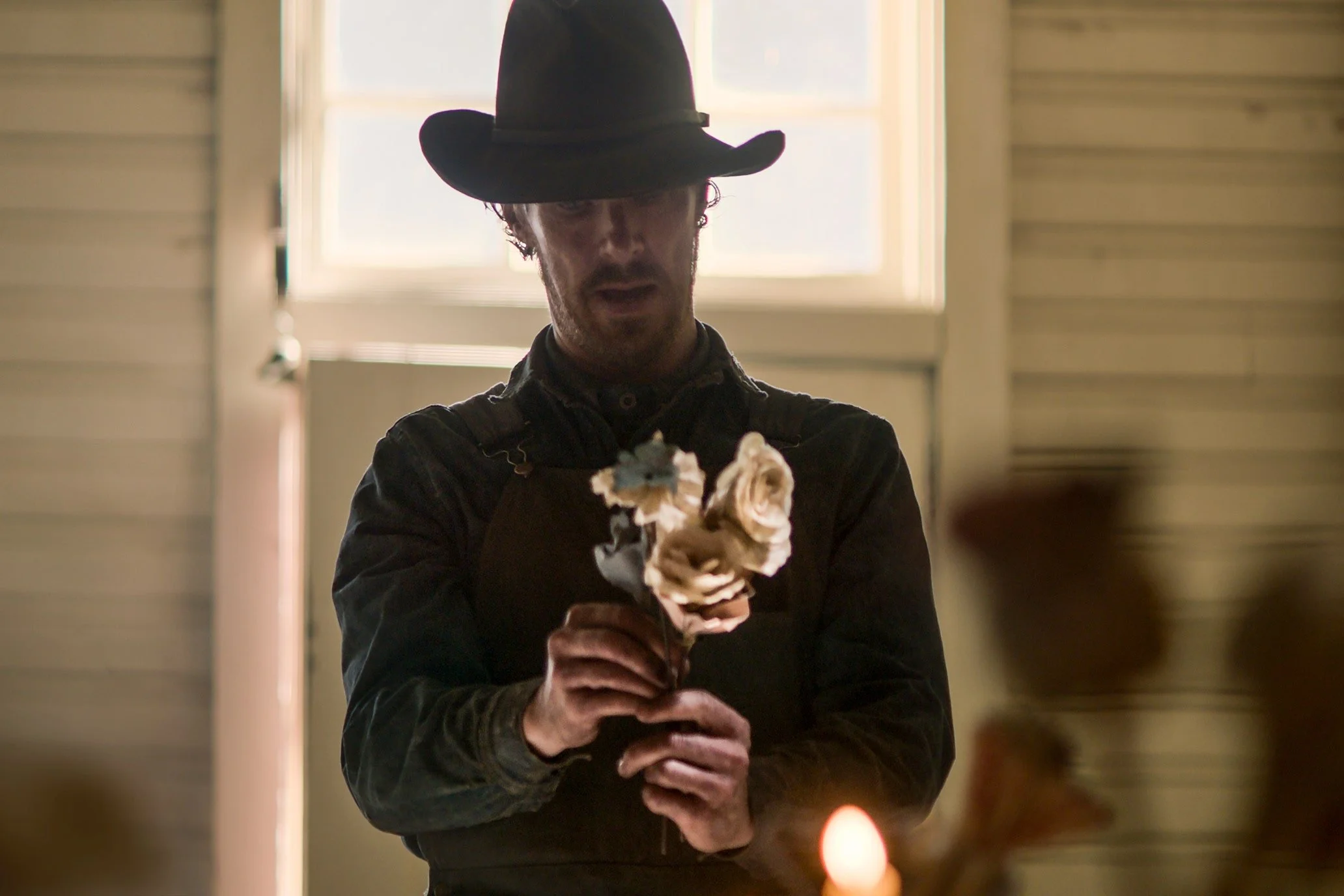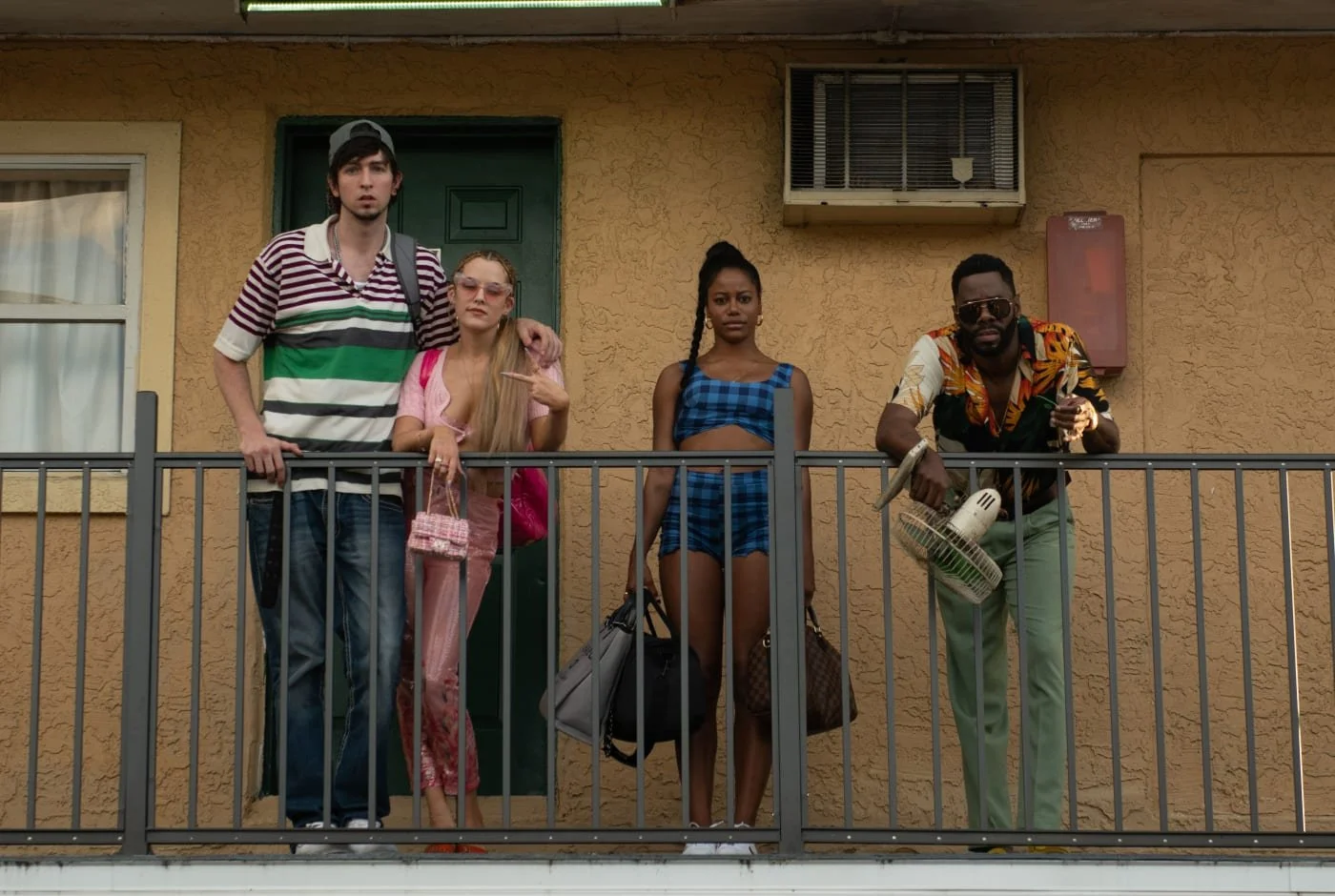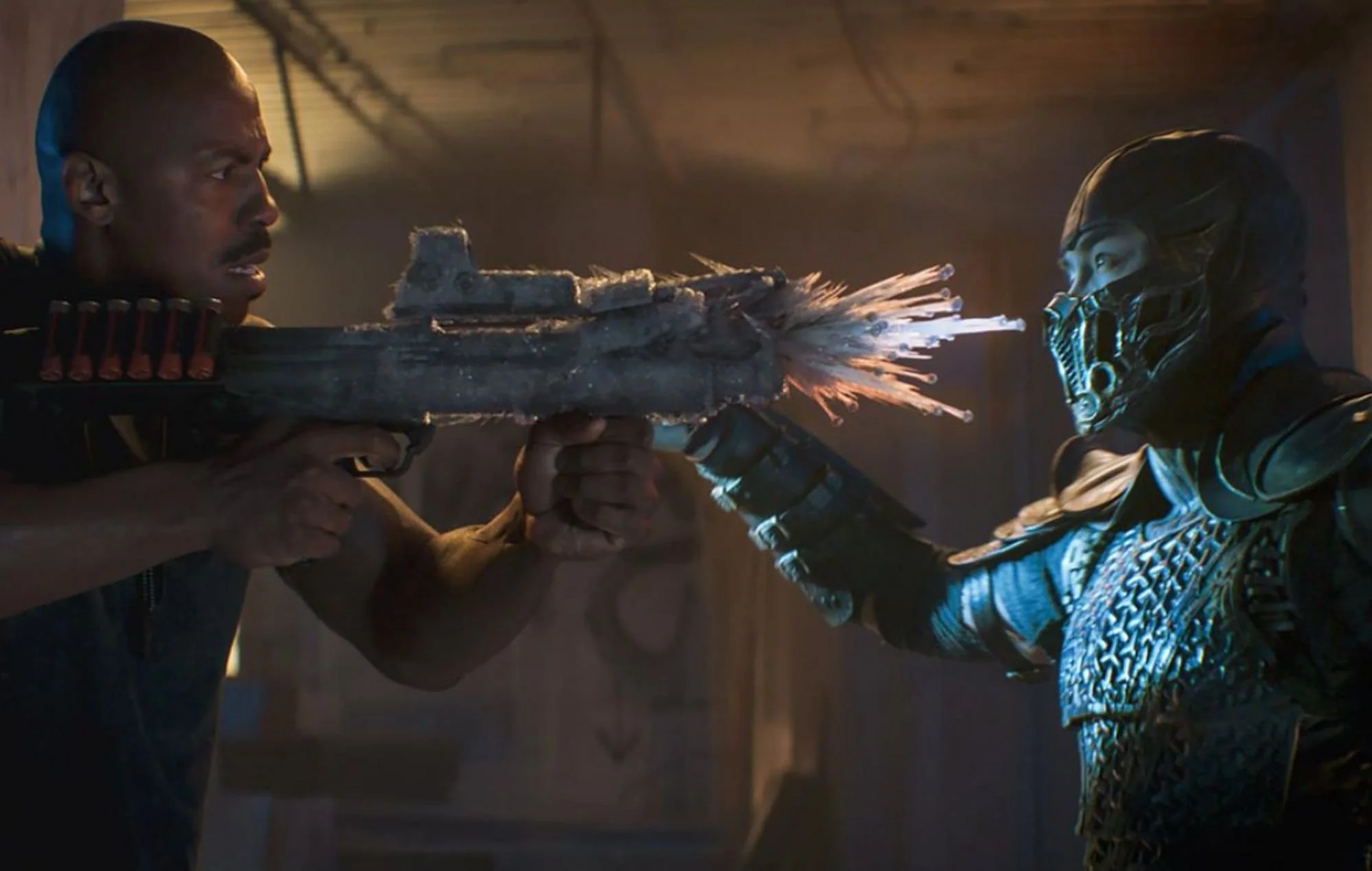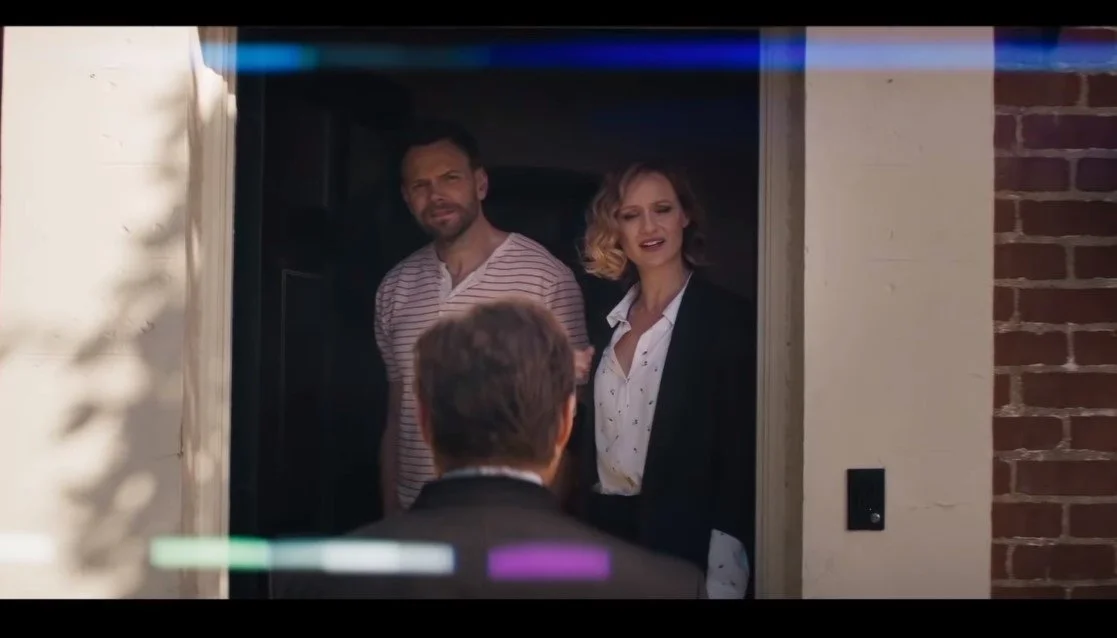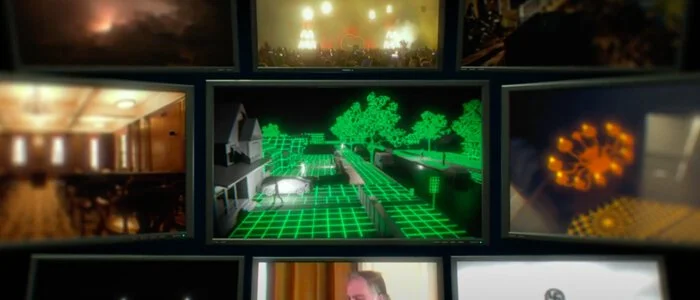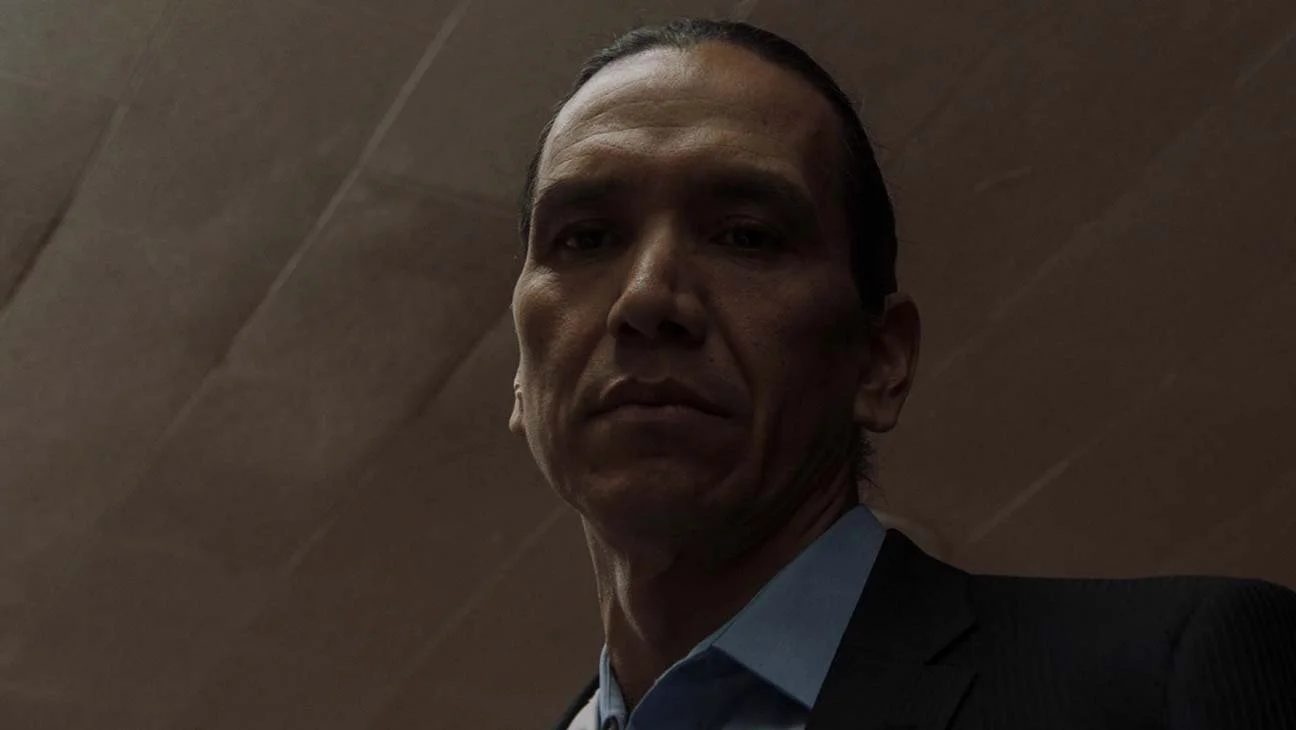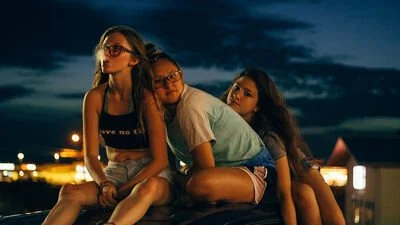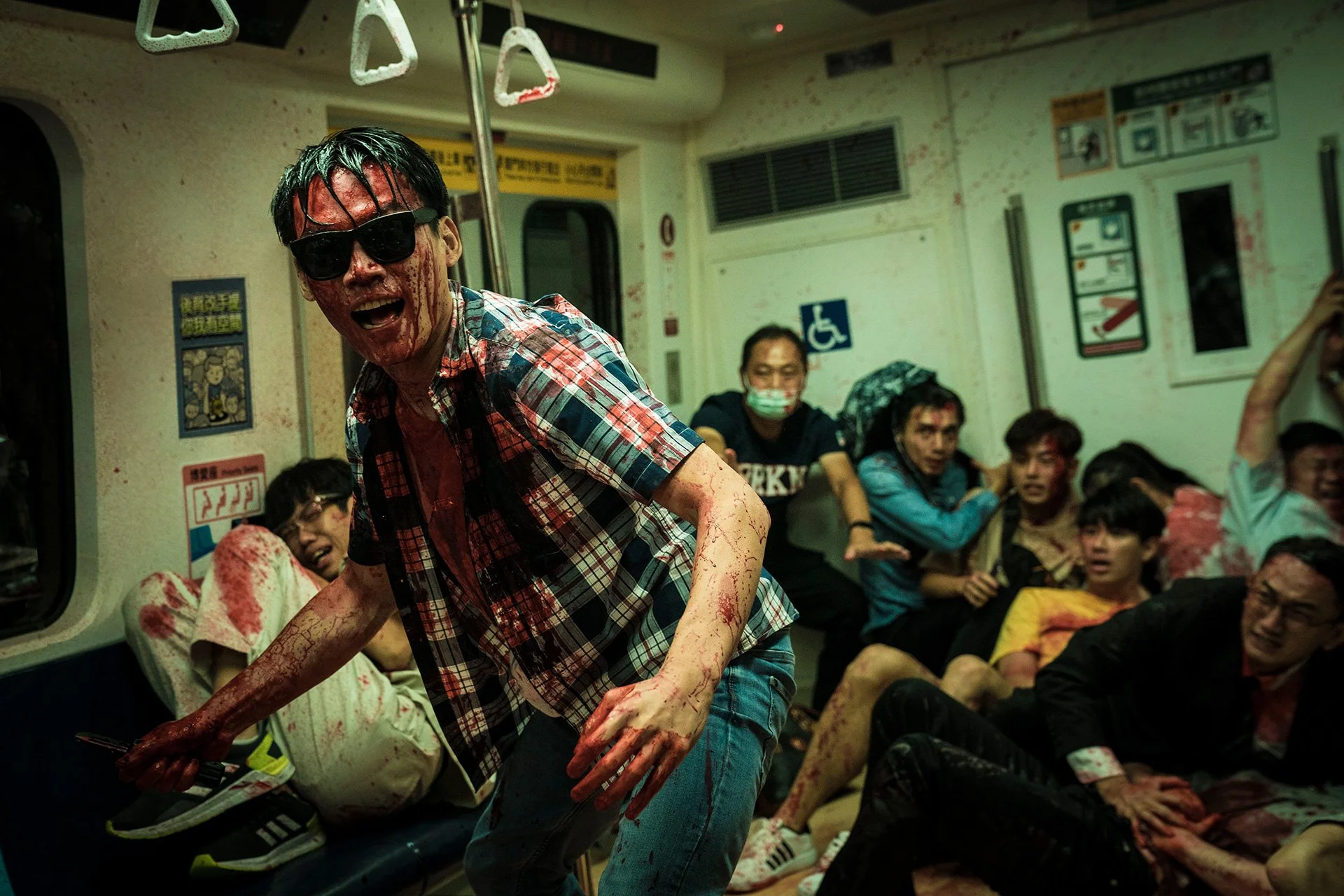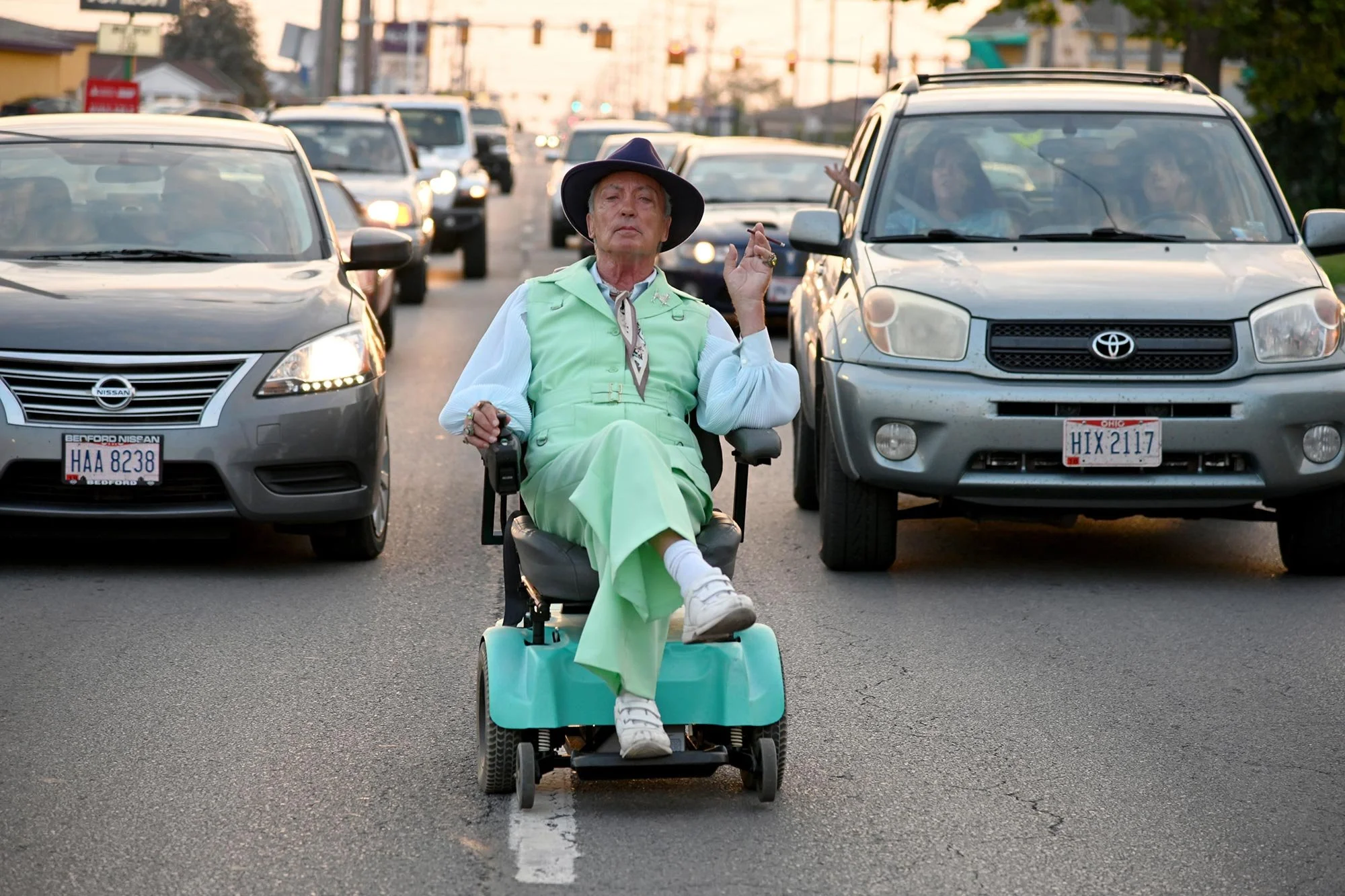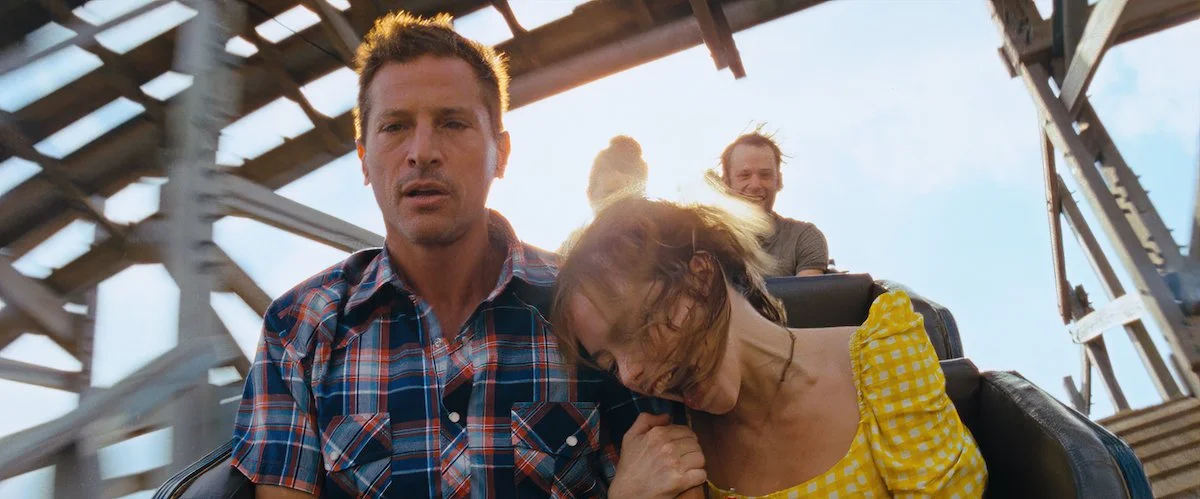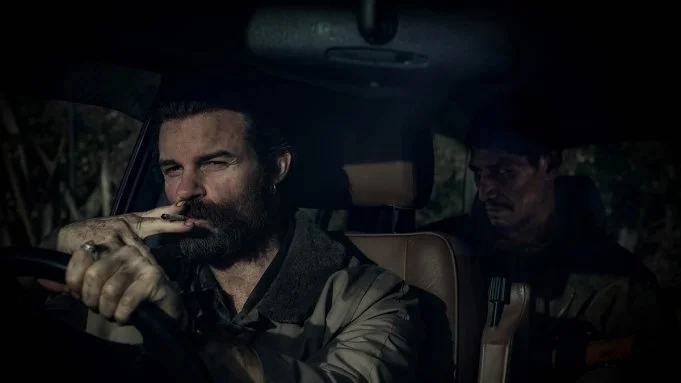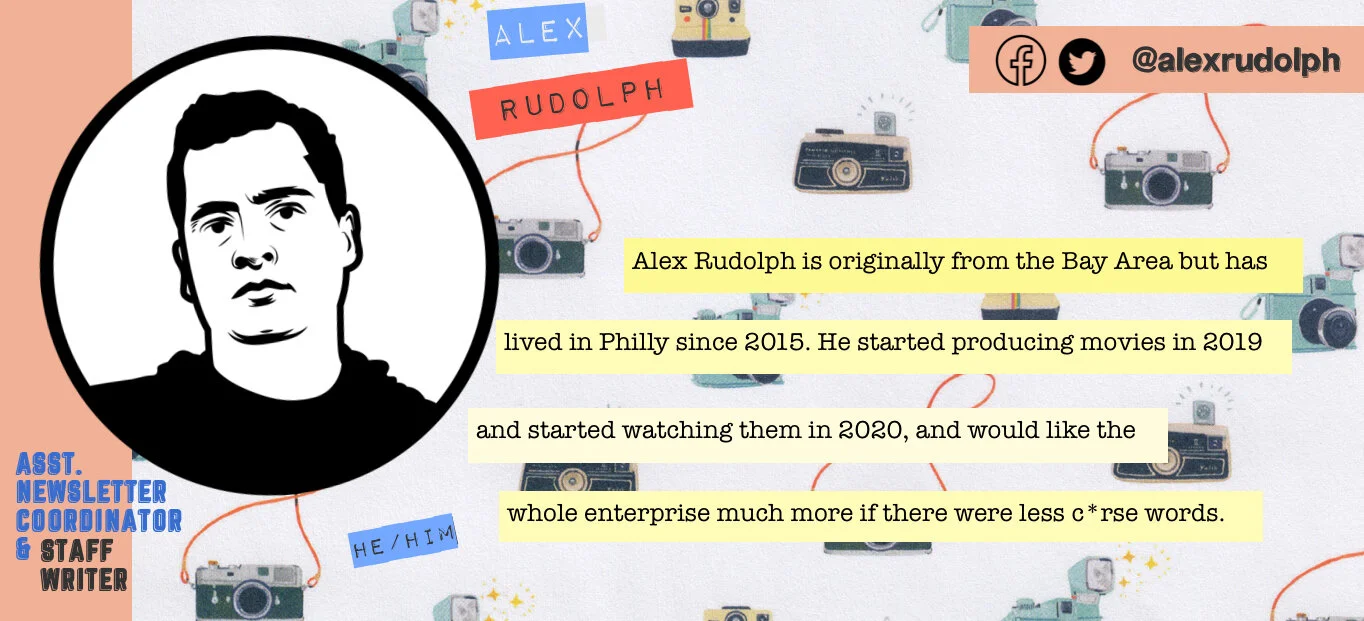Alex's Top 13 Movies of 2021
by Alex Rudolph, Staff Writer
One of the most important moments of my 2021 happened twice, in mid-October, at the Double Dagger reunion shows in Baltimore. Double Dagger, a great band whose music and shows have been deeply impactful on my life, hadn't played live in ten years, and these concerts, tied to that anniversary and the release of a rare-and-unreleased-tracks compilation, were a reminder of why I go to and participate in anything. During "Luxury Condos for the Poor," a brutal song about gentrification and the gradual white collar destruction of cities, Nolen Strals repeated the line "You're building a ghost town," as he does on record. At both shows, he took a moment to qualify who he was addressing, spinning a finger in a circle over the crowd: "What we've built here isn't a ghost town."
It was a necessary addition to a song released in 2007 that had only become more relevant with the construction of every new shipping container apartment complex. That was my fourth time in Baltimore. By no means had I helped to build the pocket of refuge Nolen was praising, but it reminded me of the things I've personally taken part in and the little bits of space in this world I've been able to stand in and think "Thank god I stumbled into this spot right here."
So Double Dagger came back for two nights and some of us stood at their shows and yelled into the mic and jumped up and down around each other. In Philadelphia, we got PhilaMOCA back and with it the Psychotronic Film Society and a calendar full of great art, live and filmed. Concerts in general trickled back, probably in ways they shouldn't have. I got tested twice in four days and flew to Calgary to see a couple films I had produced with a few of the people I had produced them with. I drove across the country and saw my family for the first time in 18 or 19 months. A week after the Double Dagger shows, my partner and I found out she's pregnant, and I'm sure somebody I forgot to tell is finding out for the first time right now, and I'm sorry for that. It's been very busy and stressful. This year, to me, was about remembering the things we've built in and outside of the ghost town.
I am weighing some movies accordingly. I loved everything on this list, but I'm not going to pretend that seeing something with a friend at the Philadelphia Film Festival didn't mean anything. The fix is in. The theater experience's thumb is on the scale. The last thing I saw in theaters in 2020 was Bloodshot, a forgettable movie I liked well enough at the time. I cannot pretend that being with people after waiting all that time since Bloodshot didn't mean anything to me. Being with people was important.
Notes and caveats:
The third most important moment of my 2021 came when I took that trip to see my family. I was eating ice cream outside, in Palm Springs, in August with my mother. Next to the ice cream parlor, there was a bath and body shop and there was a person outside that store giving away lotion samples in little cups on a tray. A passing dude picked up one of those cups and ate it, thinking the lotion was ice cream. He then got pissed that his friends laughed and argued that you shouldn't be able to give away small cups of things so close to an ice cream place. I would give up all of these movies to live in that moment again. I would sell the next ten years of my life for it. Nothing to do with movies, but my mom and I saw a man eat lotion.
Joe Pera Talks With You was, as it has been on my past two best-of lists, my favorite thing I watched this year. But it's a dang TV show. I wrote about that as it aired.
Other favorite shows included Search Party, The White Lotus, The Other Two, How To with John Wilson and especially Saturday Morning All-Star Hits. There's an argument to be made that TV and movies are similar enough to show up in the same list, but the three that would have made it, Joe Pera, John Wilson and Saturday Morning All-Star Hits, are reliant enough on being episodic that I don't think they'd actually belong on a movie list.
I deeply enjoyed the films See You Then, The Beta Test and Disfluency but am somewhat connected with each and would feel weird including them here.
My favorite shorts were This Is The Way We Rise, Excuse Me, Miss, Miss, Miss, Ava From My Class, Put a Stick In It and You Wouldn't Understand
2020 movies that I watched in 2021 and would have made last year's list include Sound of Metal, Boys State, The Nest and The Kid Detective
movies I wasn't able to watch but based on directors' past work, would probably be up here if I had: Memoria, Macbeth, Licorice Pizza, Benedetta. Their exclusion means nothing. They may be terrible, they're probably great. If I wasn't worried about catching COVID in this omicron hell, I'd go see them all.
Carmen Christopher: Street Special is a stand-up performance but it would have made this list if it wasn't 32 minutes long. It would be in my top three, easy.
Movies:
*The Power of the Dog (dir. Jane Campion)
None of these rankings mean much, but The Power of the Dog is a special, floating case anyway because I watched it last night and am in no place to interrogate it against these other things that have been sitting with me for at least a month. I'm sure it would be among them, though. I haven't read the source novel, and maybe I'm just saying this because of the American West setting and the queer characters, but Campion continues to remind me of Annie Proulx. Brutally unsentimental stuff. As an overly sentimental and nostalgic person, it hits me hard. Need to read some Thomas Savage so that I can feel like an idiot for comparing this story to Proulx's.
13. Zola (dir. Janicza Bravo)
It's style over substance but who cares? Substance would only take away from everything Bravo and her team are doing. When Zola was announced, there was all of this "They're just adapting Twitter threads now?" chatter and it was so tiring. Adapt whatever you want. Adapt a single tweet into a movie. Adapt some shit you wrote in your phone when you were going to work. If the movie is good, there's no part of me that cares where it came from.
12. Mortal Kombat (dir. Simon McQuoid)
It would be wrong to say I'm invested in the Mortal Kombat lore, because that implies some emotional connection. It could all go away tomorrow and I wouldn't mind. But I'm interested in it as a big, dumb amalgam of things kids thought was cool in the early '90s. I love that video games as a medium are screaming "We are a valid venue for mature storytelling!" and the Mortal Kombat series is still out here pitting an ice ninja against a hell ninja while special forces agents track down bounty hunters with metal eyes and sometimes a guy whose entire backstory is just "Bruce Lee" swoops in to save the day.
This was the first movie I saw in theaters since March 2020. It screened for three critics, myself included, on the big screen at the Philadelphia Film Society. It was empty, we were silent and all the posters and event fliers on the walls were for things that had been canceled a year earlier. I cannot imagine a weirder way to see something this dumb. I reviewed it here.
11. Happily (dir. BenDavid Grabinski)
It's truly wild that Breckin Meyer is in one of the best movies of 2021. Good job, guy.
Happily plays on your comfortability with what can happen in a sci-fi-ish indie comedy like this and then it plays on you realizing you're watching something more grounded than you had assumed, and then it goes back and forth like that for another 80 minutes. Heck of a thing. There's a good chance you haven't heard about Happily-- it ran below the radar and I only found it via Riley Stearns' instagram. A basic summary: Joel McHale and Kerry Bishé play a long-married couple who deeply love each other, to the annoyance of everybody in their friend group. Right before a vacation with those friends, a weirdo played by King of the Weirdos Stephen Root shows up at their door and insists they take a mystery serum that will bring their affection levels down to acceptable levels. And then everything from there is beyond what I'd want you to know going in.
10. A Glitch In The Matrix (dir. Rodney Ascher)
A movie about simulation theory from the director of Room 237, the documentary of bizarre fan theories about Stanley Kubrick's adaptation of The Shining. It doesn't matter whether we're living in a computer simulation, it matters that some people think we are. It matters that we live in a world that can actively make you feel disconnected from everybody and everything. Glitch ends up being more about Philip K. Dick than it is about The Matrix and more about the Internet than anything. But, you know, in a good way, not a surface-level "the algorithm is a bad thing." Because no shit. It's 2021, the Internet has been around for decades, we've all earned a movie that doesn't explain the popularity of YouTube.
The black hole at the center of Glitch is probably my favorite scene of the year, an uncut tour of a 3D rendering of a house. It's narrated by a victim of simulation theory and it's almost unbelievably upsetting and once you realize what you're watching, you want to turn the film off. I reviewed the movie here. It's probably the review I felt best about this year.
9. Judas and the Black Messiah (dir. Shaka King)
I wish this had done better financially, but I wish most things did better financially and anyway I'm thankful Judas and the Black Messiah was released on HBO so that I could watch it multiple times opening weekend. The Fred Hampton story would make necessary source material for a film anyway, and Shaka King's decision to tell it by giving equal time to Bill O'Neal, his largely forgotten betrayer, is such a brilliant call. And that's the best thing about one of the best movies of the year–you get Daniel "Kallelujah" Kaluuya and LaKeith Stanfield bouncing off each other for two hours. Finally, the promise of their one Get Out scene, fulfilled! And as with anything he's in, Jesse Plemons deserves a shoutout.
There's a warmth to Kaluuya's performance that I haven't seen in his other work. He's always good, but his intensity is usually icy. Playing Hampton, he turns that into pure charisma. You know how the movie ends before you even knew there was going to be a movie. Kaluuya's work makes knowing that much harder.
8. Pig (dir. Michael Sarnoski)
Another of my favorite scenes of the year is the one in Pig where Nicolas Cage tears a former employee down as Alex Wolff watches, stunned. The problem with a Nic Cage movie is never Nic Cage. It's often that the other actors don't know how to play off somebody coming at the material from his direction. He fights naturalism in a medium that so often strives for it. Pig works because Cage is great, obviously, but it also works because everybody else meets him where he is. "We don't get a lot of things to really care about," Cage says, and the two other men at the table look at him with the full, terrifying knowledge that he is correct.
That's so many Cage movies: a man knows what he wants and he needs to get it. He's played more obsessed men than anybody this side of Jimmy Stewart. He always knows how to play that obsession, whether it's over-the-top or vicious or compassionate. Pig is Cage pulling out every one of those over the course of a single film.
7. Wild Indian (dir. Lyle Mitchell Corbine, Jr.)
When I reviewed Wild Indian for this site, my headline read "Wild Indian is a study of trauma as elliptical as it is potent," which is way too many empty buzzwords for a movie this good. Shortly after I wrote that, an actor in another movie went semi-viral for saying "this is a movie about trauma" in a dozen interviews, and the word "trauma" felt even emptier (no offense to that actor-- I don't think you need to employ a different dictionary every time you do press). But this is a movie about trauma. Sometimes, that's the word. Unspeakable shit happens and that begets unspeakable shit and that begets unspeakable shit and one character feels it. His foil and former friend does not. And that's something I learned from Wild Indian: it turns out the absence of trauma can, in a good movie, be as heavy as anything.
6. Titane (dir. Julia Ducournau)
I knew Titane was about a woman who fucked a car. What a gift, to not know what I was in for. I loved Raw and I was ready to see Ducournau's next film and finding out what I was sitting in the theater to see as I was seeing it was a special feeling. The only other thing I'll say is that I think The Kills are a very mediocre band, but "Doing It To Death" is a very good song. Titane elevates everything it incorporates. That Future Islands song was already incredible, though.
5. Cusp (dir. Isabel Bethencourt and Parker Hill)
The title becomes tragic when you realize they've already had to mature well beyond the point you'd expect somebody on the cusp of adulthood to have. Next year, I'm going to work on a documentary in a similar location, potentially with kids in a similar age group, with a similar Frederick Wiseman/Maysles Bros. vocabulary, so it's possible some of my awe at Cusp is based on jealousy that directors Isabel Bethencort and Parker Hill completely knocked this out of the park. They capture so many little moments that stunned me, namely the dick pic version of Werner Herzog listening to Timothy Treadwell's death. Sometimes a Confederate flag would show up in the background and I'd think "Oh, right, these girls would hate me," but that led to more empathy, if anything, because I know that men, abusive parents, economic depression, etc. have put perfectly lovely people into toxic situations. Three teen girls (plus sisters, boyfriends and a mother) live in rural Texas and confide in each other. Each girl has been sexually abused, not because the directors sought out people who could speak to abuse but because the directors bothered to ask them about it. The film ends with the girls giving each other nipple piercings; I couldn't believe what I was watching, not because the content is explicit (it's shot with respect) but because the subjects trusted the filmmakers so much they'd allow them to roll during such a private experience.
I think I understand the teen appeal of Lil Peep now.
4. The Sadness (dir. Rob Jabbaz)
This was the only film I saw more than once in theaters. Over the course of two festivals, I watched it 1.5 times. In September, I sat down at a Sadness screening at the Calgary International Film Festival and got about an hour in before one of the people I was with started panicking and we had to leave.
I don't blame her for not being able to stomach everything on display in this rush of pseudo-zombie violence. I wouldn't blame anybody. The Sadness is about as far from a universal recommendation as you're going to see this year. Body parts get ripped off, babies are killed, the infected masses sexually assault each other. The Sadness is, despite this, often very funny, sometimes because it's over the top, sometimes because you're so uncomfortable you have to laugh and sometimes because the movie takes detours into out-and-out absurdity.
I am somewhat hesitant to write this, to publish something where I call The Sadness "often very funny," for fear somebody doesn't make it past the first twenty minutes and thinks I'm a sociopath. But this film, directed by a Canadian ex-pat in Taipei, builds and builds until, say, a televised press conference urging calm and restraint ends with the president's head blowing up, Scanners-style. If you don't wade that far into the viscera, you're fine, just please don't think the more serious scenes of hardcore mayhem had me giggling.
There are bits of politics around the edges of the film-- as with COVID, plenty of stubborn assholes refuse to protect themselves from a virus that causes "the sadness," figuring their YouTube research makes them more fit to judge a pandemic's impact than the people who professionally judge pandemics' impacts-- but it's all secondary to survival. This is primarily a film about a couple trying to find each other in a busy, apocalyptic city.
The film's highlight, also the highlight of horror in 2021, is a long, mostly non-physical fight against a shitty man. So many movies this gory disregard suspense altogether, or they stretch things out in between shocking images in a pretentious placeholder for tension. The Sadness is the rare extremely graphic slowburn. As our hero Kat reads a book and tries to get away from a "Hey, why don't you give me a smile?"-style lech, the metro car empties and fills, and we cut to street-level carnage. It's an uneasy set-up being told parallel to another plot's punchline. There's no pretense that Kat will have anything but the worst 20 minutes of her life down there. When the other shoe drops, the violence comes in quick waves. The intensity is always at 100 but the way it's released gets switched up, to the point that you're never allowed to fully relax. There are maniacs on the surface and negging dudes in the subway tunnels and we have to sit there and watch the two begin to overlap.
The director is very nice, by the way. I was late walking into the Calgary screening and, as I tucked into the back row, Jabbaz stood up and moved aside so that my friends and I could all sit together. I nodded my thanks and he went back to watching his own film screen at what must have been an illegally high volume. When we left an hour later, as my friend was shaking, I felt bad that Jabbaz was right there, watching me leave. Having seen The Sadness in full now, I'm pretty sure I gave him the reaction he wanted when he put in an order for all the fake blood in Southeast Asia. It's a brutal, discomfiting film that continually knocks you off balance, a work so uncompromising you don't make it without hoping somebody's going to throw their hands up and say "Forget it, I'm done!" No judgment call here, but if you're the kind of person who can stick around, you'll be rewarded with a perfectly nasty piece of horror.
3. Swan Song (dir. Todd Stephens)
I think the specific moment when I finally teared up was Udo Kier, on finding out his old sanctuary will be turned into a trendy bullshit bar, asking a bartender "But where will we dance?" I saw Kier in two buzzy movies last year-- The Painted Bird, which I only finished because I had to for a review, and Bacurau, which I liked. He was even more intense and sinister in both of those than he usually is. He was great. It's almost as if he needed to be in those to solidify that image in the world's brain, to lay a misdirect runway for Swan Song and what might be his best ever performance. The whole movie's great, but the scene in the park with Kier and Ira Hawkins, who died in November, through the "Dancing On My Own" sequence immediately following it, is as good as movies get. That would have been the best short of the year if it wasn't the best part of one of the best movies of the year.
2. Red Rocket (dir. Sean Baker)
I want more movies where the worst possible thing happens and the wrong person gets rewarded for doing the wrong thing. Daniel Clowes once said that "likable characters are for weak-minded narcissists," and I don't think I'd go that far (on a normal day, I don't think he would, either), but there's something to that. Make me uncomfortable. Fuck me up. Be honest with me. I am old enough to know that Mikey Saber wins. I'm an adult and I can take it.
1. Coming Home in the Dark (dir. James Ashcroft)
My other great festival experience, albeit one experienced in total isolation. Coming Home in the Dark was one of the secret screenings at the online Chattanooga Film Festival and, knowing nothing about it and assuming I'd just watch five minutes of whatever mystery film was set to play, I sat in bed (very high) and pulled it up on my phone. Ninety minutes later, I had seen the entire thing.
Luckily, I didn't close the window on my phone, which meant I was able to continue to rewatch Coming Home in the Dark outside of its viewing window (sorry, Chattanooga Film Festival). I cast the movie to my TV the next morning and watched it again. I'm not talking about the plot because I'd rather you just see this if in you're at all the kind of person who enjoys hyper-stressful horror (think Green Room or The Descent). People are going to recommend this to close friends forever. It'll spread and spread and we'll all wish it hadn't come out at a time when we couldn't just see it in theaters. And I hope this is the last movie like that.
Special Mention:
Many Saints of Newark is better than anybody gave it credit for
Persona is an excellent doc that starts a little scattered. I was especially shocked by the guy who said that jobs are doing you a favor when they reject you, because why would you want to work on something you wouldn't excel at? This person, who both defines what it means to excel and who lives in a world where people only work because they love their jobs, is everything wrong with the world.
Don't Breathe 2 was very good and I can use this pun by mentioning it here: Don't Breathe? Twice? It's all right.
PVT Chat, Wrong Turn, Final Account, The Card Counter and Killing of Two Lovers were all very good. First two were a little empty, last one kind of fumbled its ending.
Come True isn't a perfect movie but I love the 30 minutes where it becomes a visualizer for an Epic Synth Album.
Let's talk Nomadland for a second. It isn't a Ken Loach movie. If it went that hard on its characters and was more realistic about poverty, it would probably be a better movie. And I think it's terrible to work with Amazon. Just film in a different warehouse. But I don't think Nomadland gilds Amazon's edges as much as others do. There's a sequence where Frances McDormand's character tells her sister that Amazon pays well, which really got to me. It seemed clear McDormand's character was lying about her temporary job in order to feel better about herself, to not be totally ashamed in front of her family. She lives amongst people who chose to live in RVs, but she's there because there's no other way and she's trying to blend in with them. She's there because she has to be. It feels like part of the problem with the movie is McDormand's unreal strengths as an actor and how warm she comes off. When she's playing around with people in the Amazon warehouse, she's coping, and if you want to argue a person in her position would be too beaten down to cope in that way, I disagree but I'll hear your argument. I understand the complaints and share some of them. I still like Nomadland. Maybe it should have been more like I, Daniel Blake or Bread and Roses. It should have included at least one little thing related to the wage theft Amazon pulls against its workers. Sorry We Missed You handled that well. Loach is probably my favorite British filmmaker right now, and Chloé Zhao impressing her style onto his works for me.
Great performances in movies I didn't otherwise love: Vanessa Bayer in Barb and Star Go To Vista Del Mar, Brendan Fraser and David Harbour in No Sudden Move, Patti Harrison in Together Together
Best comic was either Sea-Diver by Nathan Cowdry or Good Night, Hem by Jason, best novel was No One Is Talking About This by Patricia Lockwood, best song was "New York" by Devon Welsh, best album was Acquainted With Night by Lael Neale, best video game was Wario Ware, best place to see a movie was PhilaMOCA
Friggin' nailed that Don't Breathe 2 joke. Ha cha cha!
Sincerely, thank you for reading. I hope you have a good 2022 and I hope I see you in it. So many times this year, I returned to the Leonard Cohen line "We are ugly but we have the music," and it helped me, even though I always knew everybody has the music. Every spectrum of beauty and stress and friction gets access to the music. The second part of that lyric isn’t contingent on the first. Loneliness doesn’t earn you anything. But if you're there, if you're trapped in that first part, I do hope you get to the second part. It was a rough, lonely year and I felt worse about myself than I have in at least a decade. I'm just happy I had you and all of this great art. Again, thanks.


